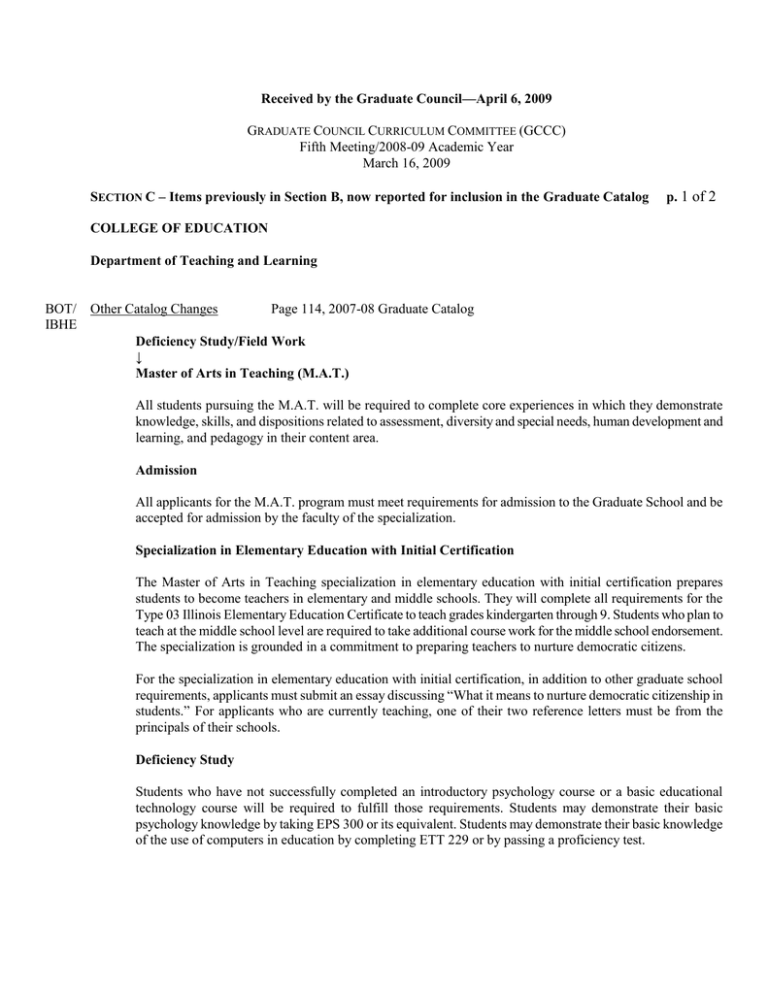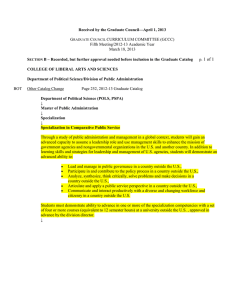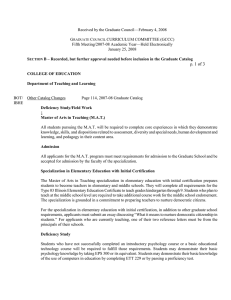1 of 2
advertisement

Received by the Graduate Council—April 6, 2009 GRADUATE COUNCIL CURRICULUM COMMITTEE (GCCC) Fifth Meeting/2008-09 Academic Year March 16, 2009 SECTION C – Items previously in Section B, now reported for inclusion in the Graduate Catalog p. 1 of 2 COLLEGE OF EDUCATION Department of Teaching and Learning BOT/ Other Catalog Changes Page 114, 2007-08 Graduate Catalog IBHE Deficiency Study/Field Work ↓ Master of Arts in Teaching (M.A.T.) All students pursuing the M.A.T. will be required to complete core experiences in which they demonstrate knowledge, skills, and dispositions related to assessment, diversity and special needs, human development and learning, and pedagogy in their content area. Admission All applicants for the M.A.T. program must meet requirements for admission to the Graduate School and be accepted for admission by the faculty of the specialization. Specialization in Elementary Education with Initial Certification The Master of Arts in Teaching specialization in elementary education with initial certification prepares students to become teachers in elementary and middle schools. They will complete all requirements for the Type 03 Illinois Elementary Education Certificate to teach grades kindergarten through 9. Students who plan to teach at the middle school level are required to take additional course work for the middle school endorsement. The specialization is grounded in a commitment to preparing teachers to nurture democratic citizens. For the specialization in elementary education with initial certification, in addition to other graduate school requirements, applicants must submit an essay discussing “What it means to nurture democratic citizenship in students.” For applicants who are currently teaching, one of their two reference letters must be from the principals of their schools. Deficiency Study Students who have not successfully completed an introductory psychology course or a basic educational technology course will be required to fulfill those requirements. Students may demonstrate their basic psychology knowledge by taking EPS 300 or its equivalent. Students may demonstrate their basic knowledge of the use of computers in education by completing ETT 229 or by passing a proficiency test. Received by the Graduate Council—April 6, 2009 GRADUATE COUNCIL CURRICULUM COMMITTEE (GCCC) Fifth Meeting/2008-09 Academic Year March 16, 2009 SECTION C – Items previously in Section B, now reported for inclusion in the Graduate Catalog p. 2 of 2 Requirements The specialization in elementary education with initial certification requires a minimum of 42 semester hours of graduate work, consisting of the following: Assessment ETRA 502, Technology and Assessment for Elementary Education (4) Diversity and Special Needs EPFE 521, Historical Foundations of Education in the United States (3) LTIC 501, Multicultural Education: Methods and Materials (3) TLSE 557, Systems for Integrating the Exceptional Student in the Regular Classroom (3) Human Development and Learning EPS 504, Psychology of Education in the Elementary and Middle School Years (3) TLCI 550 or EPS 550X Classroom Management (2) Pedagogy KNPE 574, Physical Education for Elementary School Teachers (1) LTLA 530, Contemporary Language Arts (3) LTLA 544, Exploring Children’s Literature (1) LTRE 500, Improvement of Reading in the Elementary School (3) MATH 502 or TLEE 502X, Methods of Instruction in the Mathematics Curriculum for Elementary School (3) TLEE 530, Teaching Social Studies in the Elementary School (3) TLEE 532, Teaching Science in the Elementary School (3) TLEE 561, Seminar in Elementary School Internship (1) TLEE 586, Internship (5) TLEE 587, Teaching Practicum in Education (1) Comprehensive Examination The comprehensive examination is conducted in conjunction with a portfolio completed in the last semester of course work containing required artifacts and reflections which demonstrate mastery of the professional teaching standards and degree requirements. CITC-CC 1/30/08, CITC 3/21/08, GCCC Section B 1/25/08, IBHE 10/7/08 (Note: This degree will appear in the 2009-10 Graduate Catalog.)


